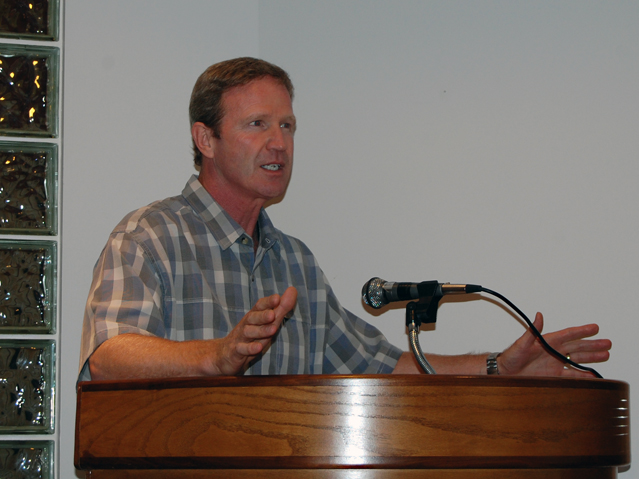
By David F. Rooney
Tourism is will take a tremendous hit if the province proceeds with its plans to introduce a so-called Harmonized Sales Tax in conjunction with the federal government, says Rod Kessler, Revelstoke Mountain Resort’s vice-president and chief operating officer.
“This is a devastating tax,” he told City Council on Tuesday, adding that he estimates the resort will take a $750,000 hit as a result of it.
And it won’t be just the resort, either, he warned. The effects of the HST will be felt throughout the community.
Revelstoke Accommodation Association President Fred Beruschi said today he is very worried by the plan.
“We’re alarmed,” he said. “However, we have to see it through. We have to see what’s ticking in the back of their minds.”
Beruschi said the tax will have a particularly harsh impact on restaurants, which currently are only required to charge the five per cent GST.
“As hospitality operators we have great concern about the impact on restaurants,” he said.
The BC Hotel Association, of which Beruschi is a past president, is lobbying the province, he said.
So, too, is the Council of Tourism Associations which has sent a letter to Hansen
“The industry needs the provincial government to know, through COTA, that the impacts of the HST could be catastrophic on many sectors and ruinous to businesses,” said the letter, which Kessler asked the Council to endorse.
After Kessler finished speaking, Councillor Tony Scarcella introduced a motion, seconded by Councillor Chris Johnston, asking Council to write a letter expressing its concern to Premier Gordon Campbell. Council agreed unanimously to that request. Mayor David Raven and Council are expected to reiterate their concerns when they meet provincial ministers at the annual autumn Union of BC Municipalities conference.
Premier Gordon Campbell and Finance Minister Colin Hansen announced on July 23 that the province would implement an HST agreement with the federal government. Starting on July 1, 2010, the HST will effectively combine the seven per cent Provincial Sales Tax with the five per cent federal Goods and Services Tax.
Information released by the provincial government says:
- The B.C. HST will provide consumers with point-of-sale rebates on a number of products, similar to PST exemptions, including gasoline or diesel, marine diesel or aviation fuel including biofuels components used in a motor vehicle, boat or aircraft, books, children’s-sized clothing and footwear, children’s car seats and car booster seats, diapers and feminine hygiene products.
- For low income families and individuals, a refundable B.C. HST Credit will be paid quarterly to help offset the impact of the tax.
- The amount of the credit would be $230 per family member for individuals with income up to $20,000 and families with incomes up to $25,000. (To read more about what the provincial government says about the HST please go to http://www.gov.bc.ca/fortherecord/hst/hs_taxpayers.html.)
However, critics say it is clearly a cash grab, perhaps intended to help pay for the 2010 Olympics.
New Democratic Party MLA Norm Macdonald said his office has fielded numerous calls from irate and deeply concerned constituents.
“People are starting to get it,” he said. “People on fixed incomes like seniors will be hurt by this.”
And so will businesses, he said.
“Resort operators, backcountry operators, heliskiing and catskiing operators are going to feel it and so are other businesses,” he said.
Macdonald said the fact that there was no discussion of an HST plan prior to or during the election makes Premier Campbell look deceitful.
“This is an idea that should have been put in front of the public he said.
Fortunately, it is not yet a done deal.
“This can still be stopped,” the MPA for Columbia River-Revelstoke said. “People have to know that. This still has to be brought before the Legislature as legislation and its implementation is still a year away. A lot can happen between now and then. But people who are concerned must speak up and be heard.”



